

Ernie Runyon interview
By Scott Stilphen
(2012)
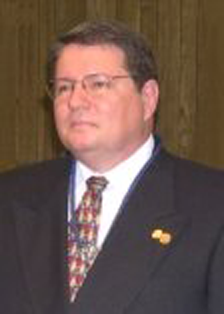
Ernie Runyon talks about programming Atari VCS/2600 Lost Luggage, and shares with us the long-lost Lost Luggage jingle!
Q: What inspired you to pursue a career in game design? Were there any programmers or games that inspired you?
Ernie Runyon: After reading an article in Compute! Magazine about Assembly 6502, and had just taken a course in Assembly programming at a local community college, and the article being about programming on the Atari 800 computer, I purchased one. It was strictly a hobby as I attempted to emulate the Atari game Star Raiders. I failed miserably, but I did learn quite a bit about 6502 programming.
Q: What’s your educational background?
Ernie Runyon: At the time, I had just completed a course at a Junior College in Computer Operations. In 1979 there was no degree path for Information Technology.
Q: How did the opportunity at Apollo come about? Were they the first game company you worked for?
Ernie Runyon: I had just lost my job at Ardan (a retail catalog sales company) and having a wife and two very young children to support, I took the advice of my Brother-In-Law who lived in Richardson, to come to Texas as the opportunities were abundant. I saw the ad in the Dallas Morning News and applied. It was only about a mile away. Apollo was the first game company I worked for.
Q: When did you start there, and when did you leave?
Ernie Runyon: I was hired in March of 1982, I think, don’t recall exactly. I was the 4th employee – Ed was first, Dan Oliver was 2nd, and Steve Stringfellow was 3rd. I left in September of 1982.
Q: What were the hours in your department? Was your schedule fixed (i.e. 9 to 5) or could you basically come and go as you pleased?
Ernie Runyon: I chuckled when I read this question. We were expected to produce a game from concept to production within 4 weeks, 6 at most, if it was breaking new frontiers. There were no “normal” hours. We were all there many, many times on all-nighters due to production deadlines. I remember Dan had it roughest. I think he may have had a new-born at home.
Q: Was the Atari VCS/2600 the only platform or system you worked on?
Ernie Runyon: Yes. When I was there it was the only thing we did.
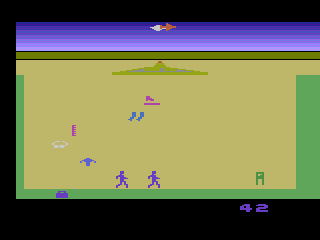 Q: You mentioned Lost Luggage was the only released game you did at Apollo. Was
Ed Salvo the designer? He mentioned the idea for it came from him waiting for his luggage at DFW and watching the carousel go round. Did you program the graphics and sounds as well, or did someone help with those? What was the easiest/hardest part of programming it?
Q: You mentioned Lost Luggage was the only released game you did at Apollo. Was
Ed Salvo the designer? He mentioned the idea for it came from him waiting for his luggage at DFW and watching the carousel go round. Did you program the graphics and sounds as well, or did someone help with those? What was the easiest/hardest part of programming it?
Ernie Runyon: Ed had discussed the idea with Pat and they came up with the concept of the carousel spewing forth unmentionables. Ed presented to me a rough sketch of what he had in mind. I did program the graphics (clouds, airplane, carousel, suitcases, articles therein, etc. We had a programmer, Larry Minor, who was responsible for all in-game sounds. To my knowledge, Lost Luggage was the very first game to incorporate music, not just sound effects (only on the entry screen, though). The easiest part of programming it was the backgrounds. The movement of the items and collisions were challenging, even for Ed. It took us a full week just to get the collisions matching the joystick movements. Remember, we only had 4K to work in.
Q: Were there any features you would have liked to added, or any known bugs or glitches that gave you trouble (or never got resolved)?
Ernie Runyon: I would’ve liked to have added luggage trains, but there simply wasn’t enough room. The main glitch I recall was when you “caught” the suitcase, a weird vertical bar figure, akin to a barcode symbol, appeared. It got resolved by re-compiling using a different computer (hardware issue).
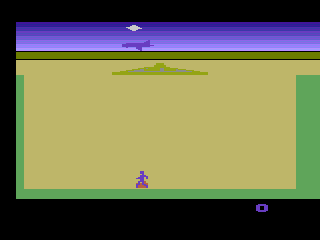
Q: How was it that 2 versions of Lost Luggage were released? The blue-labeled version contains an extra opening scene where your character brings out each of your reserve life suitcase icons, the fire button will not restart a game in progress (the green version allows this), and the game starts with suitcase worth 4 points (the green version is 3 points each).
Ernie Runyon: I can only speculate, as I had left shortly after the release of Lost Luggage. I Suppose Ed was under pressure to get something out the door, then later after tweaking the code, he gained more room for the additional features.
Q: You talked about developing another game after Lost Luggage and selling it to one of the Atari magazines (?) Do you recall anything about the game? What platform was it for?
Ernie Runyon: Yes, the game/tutorial was called Silo Defense, since it resembled Missile Command. It was an attempt to learn how to manipulate graphics and pass code between the registers at a higher rate of screen vertical sync. It was eight multi-colored cylindrical objects in which when struck by a weapon beam drained them. Once all eight drained, it was game over. This was actually done in 6502 and Atari Basic. It was mainly for the Atari 400/800 and Commodore.
Q: Did either of your games have any early or tentative titles?
Ernie Runyon: All 5 of us, the entire development team at that time, brainstormed for about a half hour before deciding on Lost Luggage as a title. I do remember one of the considerations was “Airport Mayhem”. Not too catchy.
Q: Were there any games or projects that you worked on that ultimately never got released or even finished?
Ernie Runyon: No.
Q: Do you recall any other titles that other programmers were working on that were never released, or finished?
Ernie Runyon: I do remember Blue Angels was a project being considered after Lost Luggage. The concept was to simulate 4 or 6 jets in formation performing increasingly difficult maneuvers without colliding. I do not remember any coding for it.
Ed and I both were Galaxian players and were hopeful our engineer (yes, we had one, and only one.) could come up with a way for us to use 8K EPROMs on the production line so we could make a decent stab at a Galaxian-type game. We talked about it, but that’s as far as it got as far as I know. That may have been Galaxy Defense.
Q: Occasionally, programmers would put little “Easter eggs” in some of their games that would reveal their name, or a message. Are there Easter eggs in any of your titles? Do you recall any fellow co-workers that did?
Ernie Runyon: No. With only 4K of memory available in an EPROM, and the technical edge we were following, there simply wasn’t room for such luxuries.
Q: What was it like working at the 1982 DalCon Sci-Fi convention? You set up and managed a booth there for Apollo?
Ernie Runyon: I had always been a Sci-Fi fan and a friend had told me of the upcoming event. Apollo was looking for exposure and the con being in our backyard was an opportunity. As a member of FASA (an organization of game programmers, paper and computer, not the FASA of Star Trek & Battletech fame), we were one of the first to introduce console/computer games to Sci-Fi enthusiast.
Q: Did you ever attend any industry shows, such as CES, Toy Fair, or E3?
Ernie Runyon: Not while at Apollo. That was reserved for Senior management.
Q: What were some of your experiences working in the game industry? Do you have any stories or anecdotes from those days that you relate for us?
Ernie Runyon: I was the scrounger. Ed sent me out to buy desks, printers, computers, etc. for the other programmers coming on board. On one of my excursions, the store manager we purchased desks from, also sold VCS/2600 cartridges. Lost Luggage had just been released that week and a Mom had brought her 8 or 9-year-old to buy a game. The store manager pointed out that I did Lost Luggage and she asked me to autograph the box, which was awkward and embarrassing.
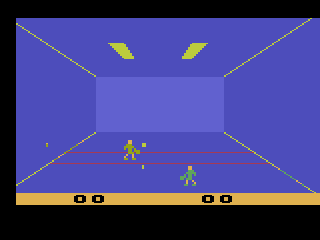 I remember Ed putting a lot of time into Racquetball and having to figure out the trajectory possibilities of the balls. I considered him a genius the way he was able to come up with new methodology on the fly.
I remember Ed putting a lot of time into Racquetball and having to figure out the trajectory possibilities of the balls. I considered him a genius the way he was able to come up with new methodology on the fly.
I also remember coming in late one night to do some coding and happened upon a co-worker chasing a scantily-clad young lady around the production line. I was sworn to secrecy.
We had a room where we performed reverse-engineering to see how the competition was coding their games. Although we were able to decipher quite a few of the competitor’s offerings, we deemed them inferior to our methods and never used any of it.
Q: You mentioned being an officer in the Dallas Atari Computer Enthusiasts (Dal-Ace) user group. What were your experiences with that, and how long were you a member?
Ernie Runyon: I was there when the club formed and became the communications officer and assistant newsletter editor. The Atari was a very popular computer platform at that time, and the club boasted a very large membership. I had set up the second Atari bulletin board system (BBS) in the world for the club on a 300bps modem. I was a member of Dal-Ace for about 4 or 5 years, and a member of NTACT (Fort Worth’s Atari club) for 3 or so years.
Q: Can you describe your career, between then and now, and where you’re currently working? You mentioned doing some CD-ROM development after Apollo…
Ernie Runyon: I had decided that I was better at organizational structuring and resourcing than programming and was approached by Heritage USA, a gaming miniatures manufacturer, who was interested in making a foray into the computer gaming market. I contacted several former Apollo employees (line workers, wave soldering operators, HR, accounting, etc) to brainstorm about what would be needed to start a venture with Heritage’s financial backing. We made the proposal and Heritage got cold feet. After that I went back to data processing, where I was employed by the City of Fort Worth for 9 years. My boys were 11 and 12 by this time and I decided to move us out of the city life and into the mountains of Virginia so the boys could be boy scouts in the Shenandoah Valley/Blue Ridge Mountain area. There I found a small English CD Audio facility which had a CD-ROM arm where I became the production manager of data mastering. While there, I discovered the method for creating a multi-boot CD-ROM for UNIX, Apple, and PCs. I moved back to Texas when the company started to farm out production, where I had an opportunity as an IT Director for a large hotel chain. I ended up being the IT Director for what was then the Opryland Hotel Texas. I lived in Nashville for 6 months designing infrastructure for data and telephony for Opryland (now Gaylord Hotels) in Florida and Texas. Since 9/11/2001, I have been self-employed/semi-retired.
Q: Do you still own a copy of your games, either as a keepsake, or to show friends or family?
Ernie Runyon: No. I only have a couple EPROMs on bare cards, and EPROM burner and ultraviolet light left. I did keep a copy of the jingle Bryan had made for Lost Luggage. Friends think I’m lying to them, so I don’t bother talking about those days. I also have a tape of Leeza Gibbons' PM Magazine interview that was done at Apollo:
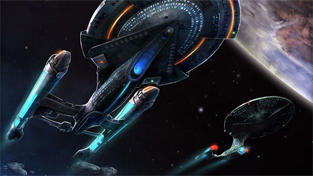 Q: What types of games are your favorites?
Q: What types of games are your favorites?
Ernie Runyon: My favorite type of game has become the MMO/MMORPG's. I used to play a lot of military games like Battlefield franchise, but World of Warcraft has consumed all my time the past year. However, Star Trek Online has now replaced WoW.
Q: Have you stayed in touch with any of your former co-programmers?
Ernie Runyon: Not at all. They probably don’t remember me J
Q: What are your thoughts on how the industry has evolved?
Ernie Runyon: Personally, I feel Atari dropped the ball early in the game. They had an opportunity to close the door on all competition and missed it. They could very well have been shoulder to shoulder with Microsoft. As far as the procedure for R&D, mass marketing, and online sales, I hope current companies have learned from the mistakes of failed ventures and pay more attention to their end users, so that there is more to producing a product than investor greed. Not being in the thick of the gaming industry anymore, I've become an avid fan instead.
Atari Compendium exclusive!
As an added bonus, Ernie Runyon is making available a rare Lost Luggage jingle. Ernie had this to say about it:
| "That jingle was just something Byron Parks was playing with, but it never got used. Pat Roper wanted to start advertising and was fishing for ad material. I really don’t know or remember where it was intended for use. Byron was part of another enterprise Pat had, a sound studio. As far as game sounds, Byron only did Spacechase. After doing the jingle for Lost Luggage, Byron was never around, so lost contact with him." |
| GAME | SYSTEM | COMPANY | STATUS |
| Silo Defense | Atari 400/800, C-64 | unknown magazine | released |
| Lost Luggage | Atari VCS/2600 | Apollo | released |